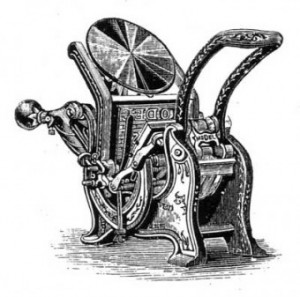This article began its life as an answer to a question on Quora, where I answer a lot of random questions about things. Publishing is one of those things. The question was, “Are Small Indie Presses Taking the Place of Literary Agents?”
TL;DR Answer – Yes.
Here’s the longer answer:
While so many people write about the death of publishing, there has been a very quiet revolution going on in the publishing industry. Webcomics, Print On Demand and other creator-driven technologies are changing the face of comics publishing. While webcomics have not yet developed into a sustainable business model for comics as a whole, they have radically altered distribution, fundraising and relationship-building for many independent comic artists.
For manga artists in Japan, printing one’s own work, or developing other’s work as a small press, is a well-established subculture and farm league for mainstream comics publishing. Larger publishers comb the halls of the major Comic Market events in Japan to discover talent already nurtured and trained by these doujinshi (which my mechanical translation tool delightfully translates as “literary coterie magazine”) circles.
In the book publishing world, as large publishing companies pull their resources tighter and tighter, focusing on proven names and mass media tie-ins, small presses are stepping into the space willfully abandoned by literary agents; finding, nurturing and publishing young talent.
I can think of a dozen or more writers and artists I know that have had success dealing directly with small presses where agents wouldn’t give them the time of day. It’s almost unbelievable when you see how poorly some agents do their job.
The other side of this, of course, is that many young/new writers are woefully, horribly, inconceivably ill-prepared for approaching any agent or publisher. I do my very best to write gentle, sensitive rejection letters when I have to. This does not help. People get angry and often tank any chance of ever working with me by writing enraged, irrational, sometimes incoherent replies, explaining how much I suck for not seeing their brilliance. I’m glad to provide guidance and advice for creators, but it’s still up to a creator to get their part of the process right.
The advantage for a writer with some few publishing credits (this would be things like magazines and anthology credits, not “I have a blog” credits) under their belt is that a contract with a smaller publisher can, over time, become an entree’ to a larger audience. (Presuming one doesn’t burn bridges, which is easy in a niche field with only a few potential publishers.) The money and the promotional support is going to be minimal, so basically all a writer is getting is editorial and printing assistance – which is worth a great deal. Unfortunately most authors don’t realize that. They just see the small advance and small sales and get pissed that the company isn’t doing more. In reality, a first-time contract with a larger publisher is also unlikely to include much in the way of promotional support. The reality for first-time authors is that they are going to be almost completely responsible for their own book promotion.
Literary agents rarely have any energy or ability to take risks. Driven by market pressures, they have to produce best sellers as quickly as possible. In the meantime, indie publishers, driven primarily by passion, have interest in and ability to develop new talent. Small indie publishers have fewer resources, but can take more risks.
Small presses, like creator-driven publishing, are definitely changing the publishing landscape.
And, no matter how I look at it, I think it’s about time that was changed.

